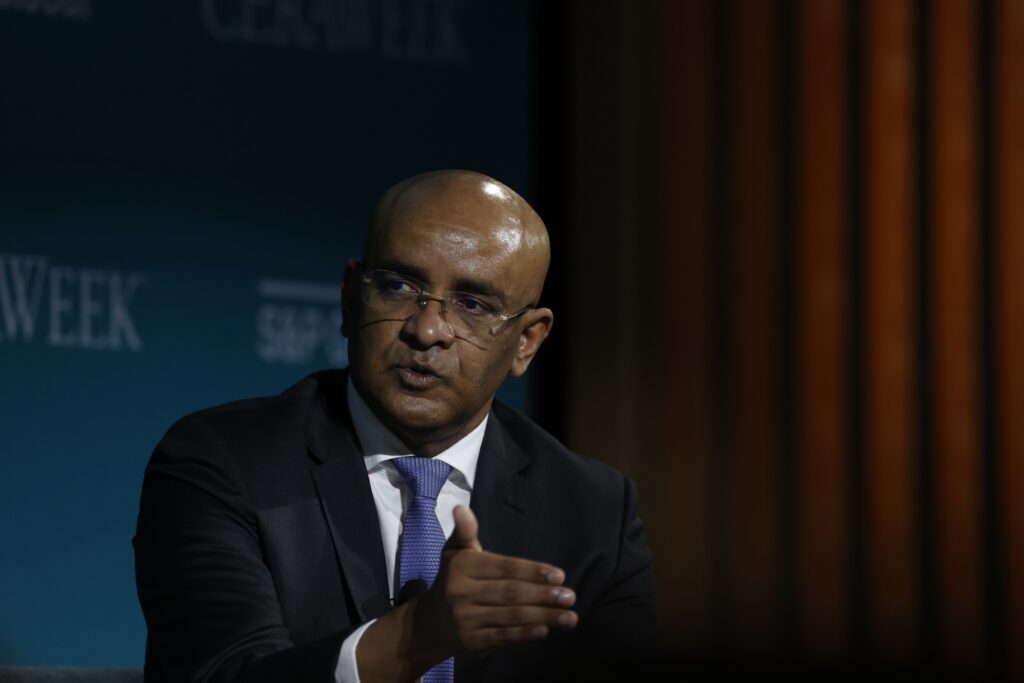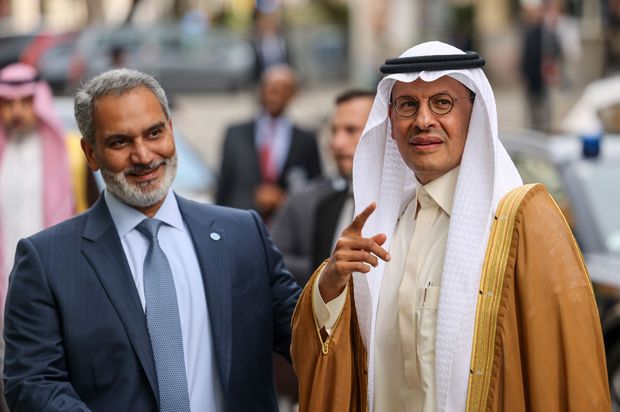OPEC woos Guyana, tiny nation that sits atop massive oil field
...Small South American country doesn’t want to join the cartel, aims to pump oil rapidly
(Wall Street Journal) Thanks to a transformational oil find, this tiny nation has built ties in recent years with the world’s most influential energy companies, financiers and governments. Now, it has a powerful new suitor: OPEC.
The oil cartel is courting Guyana to become its newest member, in a bid to extend the bloc’s influence into a small South American country that has suddenly become the world’s fastest-growing oil producer, according to people familiar with the matter.
Both Saudi energy minister Abdulaziz bin Salman and Haitham al-Ghais, OPEC’s secretary-general, invited Guyana to join the cartel in recent months, according to two OPEC delegates briefed on the approach.
So far Guyana has chosen not to join, and Vice President Bharrat Jagdeo told The Wall Street Journal that the country needs to maximize production—and profits—in the short term, given that oil demand is expected to decline in coming decades.
“Right now, the idea is to get as much of these resources out of the ground as quickly as possible given that we are not sure of the window we have in the future,” Jagdeo said.
Joining the Organization of the Petroleum Exporting Countries, according to Jagdeo, would risk Guyana becoming beholden to efforts by Saudi Arabia and other members who have worked together on-and-off in recent years to curb global supplies and prop up prices.

“We just want to hug a corner for the time being and get our national act right,” he said.
For OPEC, enlisting Guyana would be its biggest catch in years. Guyana is aiming to boost its oil production by one million barrels a day by 2028, the same amount by which OPEC’s de facto leader Saudi Arabia has planned to increase its capacity in that period.
If Guyana joins, it would become OPEC’s first new member in five years. With less than one million residents, it would be the smallest country in the bloc by population and is expected to become one of the world’s largest oil producers per capita.
The entreaties were part of a broader push by the organization to bring in new members as it faces competition from producers that are outside its main sphere of influence, the delegates said.
In recent years, the Saudi-dominated OPEC has expanded its membership with African countries and struck an alliance with Russia and other producers in the former Soviet Union and Asia called OPEC+.
OPEC has now proposed to Azerbaijan and Malaysia, which are allies in OPEC+, to join the group as full members of the cartel, but their production is small and has been stagnating, the delegates said.
Guyana’s lofty aspirations for its oil discoveries have made it a bigger target than most. Exxon Mobil and its partners have sanctioned more than $40 billion in oil projects there, with five projects expected to pump more than one million barrels a day combined by the end of the decade.
That is roughly equivalent to U.S. plays like the Eagle Ford in South Texas or the Bakken in North Dakota currently produce. Since 2015, Exxon and its partners have made more than 30 big finds there, with output coming in at more than 360,000 barrels a day by the end of last year.
The companies estimate the Stabroek Block off Guyana has 11 billion oil-equivalent barrels. It has become the world’s most promising oil play, investors say.

As its oil production has grown, so has Guyana’s presence on the global stage. The country was elected a nonpermanent member of the United Nations Security Council earlier this month. Its economy has expanded rapidly and foreign investments have begun to flow to infrastructure projects, in support of the country’s power grid and port operations.
The oil-sector growth has triggered a freer flow of higher-priced goods and drawn investors to plunk money in hotels and restaurants in the mostly jungle-covered country. The International Monetary Fund projects gross domestic product will rise by 37% this year.
Jagdeo said the cartel has invited Guyana’s officials to meetings in Europe, but his government doesn’t believe it is advanced enough to join the group, and its production isn’t yet large enough to sway global markets. It is also still working to finalize a new legal framework for oil-and-gas that would apply to future operators.
“It sounds a bit crude to say our depletion policy is to get as much oil out of the ground as quickly as possible,” he said. “We don’t want to be part of OPEC at this point in time.”
While Guyana supports efforts to decarbonize the planet and cut fossil-fuel subsidies, he added, its government also needs to invest in its economy—in highways, power plants, food production and new hospitals.
Guyana’s decision not to join OPEC comes as the bloc is seeing its influence over global supplies and prices ebb. Oil-producing countries outside OPEC+ are set to expand faster in the coming five years than the alliance, according to a report by the International Energy Agency released in mid-June.
Non-OPEC producers are projected to boost output by 5.1 million barrels a day, led by the U.S., Brazil and Guyana, it said. By contrast, the 23 members of OPEC+ will add new capacity of 800,000 barrels a day as investments in Saudi Arabia, the United Arab Emirates and Iraq are expected to be largely offset by declines in Russia and among allied African and Asian producers.
A previous attempt by Saudi Arabia and OPEC to bring Brazil into the cartel in 2020 failed because the South American producer was concerned it would have to join production cuts, OPEC delegates have previously said.





